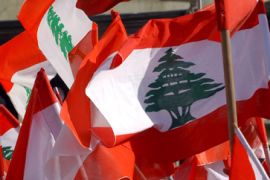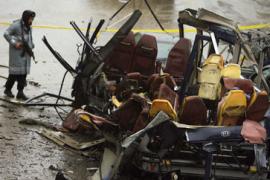Divided Lebanon debates federalism
Opinions differ over whether a federalist system will help to bridge sectarian gulf.

 |
| Shias are now the largest religious group in Lebanon [Gallo/Getty] |
As Lebanon‘s political deadlock enters its eighth month, there is growing debate over whether a federalist political system could ease sectarian mistrust and growing social divisions.
The nation is split down the centre with the opposition, comprising Shia Hezbollah and the Christian Free Patriotic Movement (FPM), trying to unseat the government, which is backed by the Sunni Future Movement, Druze Progressive Socialist Party (PSP) and the Christian Lebanese Forces (LF).
The opposition believes the current political system, which allots power based on the size of Lebanon‘s 18 sects, weakens their share of the political pie.
| Special report | ||||
|
They say the last nationwide census held in 1932, which gave Christians majority power, is now defunct because of changing demographics.
Shias have grown to become the biggest sect but retain limited governmental power.
Fears of a renewed sectarian civil war, set against the backdrop of the Lebanese army’s military campaign to dislodge what it described as terrorist cells in the Palestinian Nahr al-Bared refugee camp, are also seen as reasons for a federalist paradigm.
Sectarian turf
And a sectarian turf war seems to be brewing. During the military campaign in the refugee camp, a spate of bombings targeted Christian neighbourhoods and interests.
Amin Gemayel, head of the predominantly Maronite Christian Kataeb Social Democratic party, lashed out at the violence, telling reporters that “the Christians will not be still when there are threats against our existence”.
Recently, three Internal Security Forces (ISF) policemen were arrested and interrogated by Hezbollah in Dahiyeh, a predominantly Shia southern suburb of Beirut, after trying to settle a street fight.
Though a national force, an ISF spokesman told Al Jazeera that “the three entered an area off limits to Lebanese forces”, as it is Hezbollah-protected territory. The officer declined to give his name because he was not authorised to speak to the press.
 |
| There are fears of a return to Lebanon’s violent past [AFP] |
The incident was reminiscent of similar security no-go-zones Hezbollah established during the January 23 general strike. Hezbollah‘s special forces, the Indibat, encircled Dahiyeh, barring entry to outsiders.
Residents of the Sunni southern town of Naameh also established checkpoints that day.
Simmering distrust
Jean-Pierre Katrib, head of public relations for Loubananouna, a federalist lobby group seeking a federalist solution to Lebanon‘s sectarian tensions, told Al Jazeera: “Federalist lines still exist in the souls of Lebanese though they don’t know it. Many district schools teach their own version of what happened during the 1975-1990 civil war.”
Loubnanouna (“our Lebanon“) believes that sectarian strife and mistrust survived the war and simmer below the surface as power struggles are translated into inter-community strife.
Katrib said: “Even our basketball teams are divided along the confessions. The Christian Blue Stars played the Sunni Riyadeh team the other day, and to rile each other up, Christian and Islamic religious slogans were being chanted on either side.”
Loubnanouna is preparing a federalist constitution to be presented to parliament by early 2008.
The lobby is targeting all political groups in closed-door meetings with party leaders to explain federalism’s merits.
1970s war revisited
Jennifer Skulte-Ouaiss, a political science professor at Lebanese American University, said: “A rational response of people in times of uncertainty is to rally around what you think will protect you. The sect is what protects you and also makes you so vulnerable in Lebanon.
|
|
“There’s not a lot of central government control now, or control anywhere.”
This lack of central control, argues Loubnanouna, creates de facto federalism based on territory and security, where militias emerge to provide security for their communities as Hezbollah does and as most sects did during the civil war and throughout January this year.
Loubnanouna’s federal formula is based on a power sharing formula between smaller mini-states and a central government.
Municipalities would decide their own spending on education, infrastructure and healthcare.
A central government composed of representatives from each municipality would control issues such as national security and fiscal policy.
By empowering each sect through municipalities, Loubnanouna believes that sectarian tensions will be alleviated.
Opposition to federalism
But many political analysts see federalism as a formula to effectively divide Lebanon into sectarian cantons, with ethnic divisions dislodging the unity of the country.
Nadim Shehadi, associate fellow for Chatham House’s Middle East Programme, said: “The question of federalism was brought up [during the civil war], at a very different time when divisions of the country were of a more sectarian nature. I think it’s come back because of the political deadlock, whereby the differences with Hezbollah are seen to be irreconcilable.
“But federalism wouldn’t work as the assumption of federalism is sectarian division and right now the division within the country is political and cuts through all confessions.”
Kamal Salibi, a Lebanese historian, says Lebanon is too small for federalism to be effective and advises the country to be patient.
He said: “With time, people will come to a point where they’ll say: ‘To hell with politics, I want to sell this rotting stuff in my shop.’ When more people come to this conclusion, things will change for the better.”
Taif accord
In 1989, Lebanon adopted a secular constitution drafted in Saudi Arabia, as a means to end nearly two decades of sectarian civil war.
The agreement hammered out in Taif succeeded in ending the civil war because it minimised the power of the Lebanese president and created a cabinet founded on equal power-sharing between Muslims and Christians.
Hussein Husseini, who helped negotiate the Taif agreement as then speaker of parliament, said: “In the social structure of Lebanon there is diversity within the unity but there is no pluralism.
“There are a large number of confessions and sects, but they are one people who share the same history, heritage, legacies and language.
“The common denominator essential for federalism – [pluralism] – does not exist.”
As’ad AbuKhalil, a professor of political science at California State University at Stanislaus, believes that conditions in Lebanon today differ from those prior to the civil war in 1975.
He said: “The main sectarian divide in Lebanon has changed – it is less Christian-Muslim and more Sunni-Shia. Both sects, however, are intermixed in residence and marriage, making federalism not practical.”
He proposes a third solution, secularism, which he says has never been attempted in the modern Lebanese state and may be long overdue.
